Prominent Christian Author And Theologian Has Become Gay-Affirming: We Think We Know Why
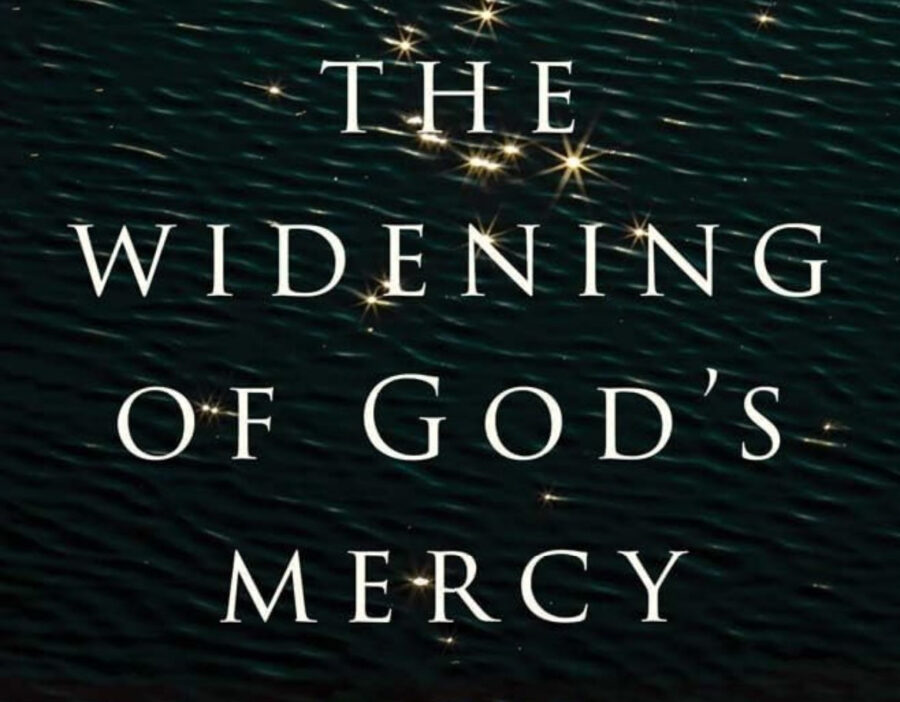
In 1996, Richard B. Hays, then the professor of the New Testament at Duke Divinity School, released “The Moral Vision of the New Testament.” It received critical acclaim from conservative scholars, many which consider it to contain the best summary of the scripture’s views on homosexuality. Theologians of all stripes have praised it, from TGC to Christianity Today, which selected it as one of their top 100 Religious Books of the Century.
In short, if your pastor pulls out a scholarly quote about the scripture’s position on homosexuality during his sermon, there’s a good chance it came from Hayes.
Nearly 30 years later, Hays has capitulated, releasing a new book in September 2024 called The Widening of God’s Mercy: Sexuality Within the Biblical Story.
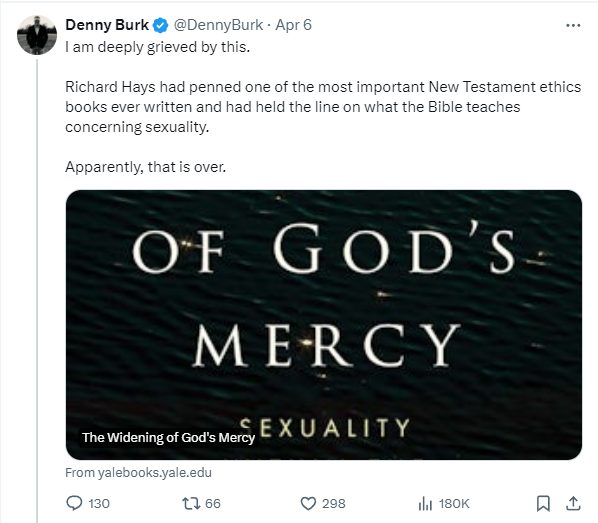
According to the book’s description, Hayes’s new venture offers a “Fresh, deeply biblical account of God’s expanding grace and mercy, developing a theological framework for the full inclusion of LGBTQ people in Christian communities.”
The book is written with his son Christopher Hays, who is ordained within the Presbyterian Church of America (PSUSA), one of the most devilish denominations in all of damnation.
The book continues:
The authors—a father and son—point out ongoing conversations within the Bible in which traditional rules, customs, and theologies are rethought. They argue that God has already gone ahead of our debates and expanded his grace to people of different sexualities. If the Bible shows us a God who changes his mind, they say, perhaps today’s Christians should do the same.
Specifically, the book’s release page reveals that “The book begins with the authors’ personal experiences of controversies over sexuality and closes with Richard Hays’s epilogue reflecting on his own change of heart and mind.”
Put another way, it is almost a certainty that a family member has come out as LGBTQ, a revelation that served as the catalyst for a change in conviction. This is the pattern we see over and over, from Andy Stanley to Jen Hatmaker to David Gushee to Danny Cortez. It wasn’t because these two men learned to read the Bible better or discovered superior scholarship.
Instead, we would almost guarantee someone near to them came out as gay or trans and they’ve made this theological shift because they love that person more than Christ, which is ironic because, in doing so, they actually hate them both.
Mark it.

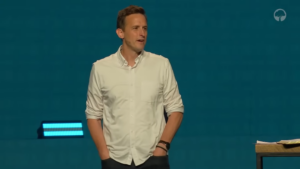

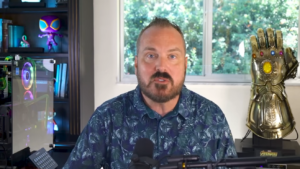
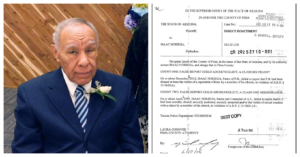


Sodomy is most detestable to Jesus Christ.
Did Jesus tell you this, or did you pull on your big boy pants all by yourself and figure it out? Because absolutely nowhere is Jesus ever recorded having a single thought on the subject, although he did talk about judgment others before you’ve cleaned up your own sins.
Jesus affirmed that sexual immorality (and other sins) does indeed defile a person (Matthew 15:19-20). And He and his Jewish audience would know from the book of Leviticus that homosexuality is a sexual immorality (Leviticus 18, particularly verse 22).
“If the Bible shows us a God who changes his mind…” ??????
“God is not man, that he should lie, or a son of man, that he should change his mind.” Deut 23:19
“For I the Lord do not change…” Mal 3:6
“Jesus Christ is the same yesterday and today and forever.” Hebrews 13:8
“Forever, O Lord, your word is firmly fixed in the heavens. ” Psalm 119:89
God’s Word is unchanging. Jesus quite clearly stated that He upheld His father’s (Old Testament) teachings which would include condemning homosexuality. God and His Son despise sexual sin, period.
“The Widening of God’s Mercy” is code for the widening of the broad road.
Next step is universalism, which effectively does away with the gospel–and especially of the need to be reconciled to God, according to His work and His mercy (ironically, given the title of this book).
Every reader of Scripture interprets it through a wholistic lens which includes all their experiences and relationships. One cannot escape that filter, and shouldn’t, necessarily. We are people in relationship with God and others. When I was an unaffirming pastor, my hermeneutica was impacted by my hatred of LGBTQ+ folks. I see that now.
I’m grateful for the courage of Hayes, to follow the Spirit, despite the arrogant and judgmental backlash he probably assumed he would get (and is getting…see above comments).
If you hated them, then you weren’t following scripture in the first place. We aren’t called to hate people who are sinners as ourselves. We are called to give them r the Gospel
The fact that you did not address the point of my comment notwithstanding, there is a blurry line between “hating the sin” and hating the one who is committing that “sin.” At the time, 25 years ago, I thought I was being loving to LGBTQ+ folks by proclaiming the gospel to them, but decades later I see that I was actually hating them by not listening to their stories, by not learning about them, by not believing some of them when they truthfully told me that they already were followers of Christ.
Yes, listen, and do so objectively, while basing everything on an objective, unchanging, divine Standard.
Nevertheless, the superlative concern remains for all of us: What about our sin and the consequences of our sin–whether it is painful and destructive outcomes while here on earth–or the ultimately consequence of not being reconciled to God and saved from the eternal outcome of the “second death” and God’s judgment? (Rev 20:11-15; Jn 3:36)
Therefore, the most loving thing we can do is to help others accurately understand and navigate the reality of their sin and its consequences, and help turn them away from these, and in so doing “saving a soul from death.” (Jas 5:19-20)
To minimize this, to avoid this, to adopt the world’s position on this–not to mention approve of a person’s sin–could not be further from actually loving them. In fact, it is classic “enabling,” by which we empower their destruction and demise.
Notice the polar opposite approaches, particularly by leaders:
Also I have seen a horrible thing in the prophets of Jerusalem:
They commit adultery and walk in lies;
***They also strengthen the hands of evildoers,
***So that no one turns back from his wickedness.
All of them are like Sodom to Me,
And her inhabitants like Gomorrah.
Jeremiah 23:14
I have not sent these prophets, yet they ran.
I have not spoken to them, yet they prophesied.
But if they had stood in My counsel,
And had caused My people to hear My words,
***Then they would have turned them from their evil way
***And from the evil of their doings.
Jeremiah 23:21-22